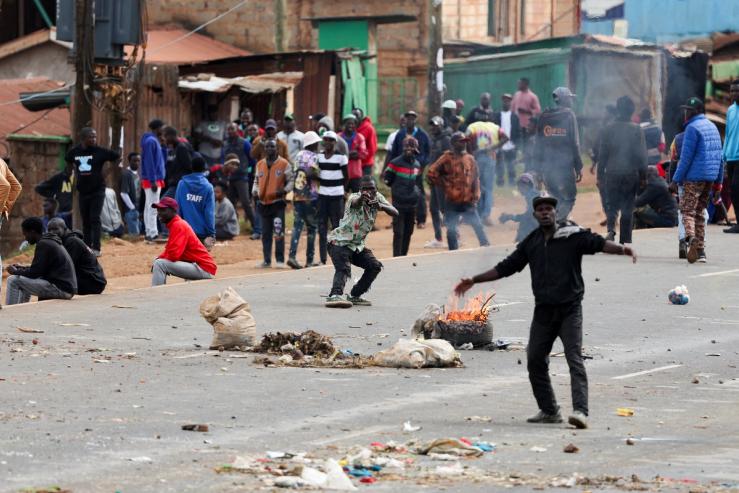The News
Kenya’s neighbours stand to attract investors who are increasingly wary of the political volatility that has gripped East Africa’s biggest economy.
Deadly protests marking a year since the wave of anti-government demonstrations that shook Kenya — once again revealing citizens’ deep grievances against President William Ruto’s administration — have severely hit businesses. Grievances expressed by protesters include complaints about alleged human rights abuses, corruption and youth unemployment. More than 50 people were killed in July.
Several investors told Semafor they were increasingly “hedging their bets” on Kenya, which has previously been attractive due to its relative political stability, technology ecosystem, and position as a regional financial hub. Four of the world’s 20 fastest growing economies — Ethiopia, Rwanda, Tanzania, and Uganda — neighbour Kenya and they are now in a position to take advantage of the economic uncertainty due to the unrest. In recent months, the countries have been rolling out policies aimed at encouraging multinational companies to set up shop.
Tanzania, for instance, has implemented policy changes to incentivize investors, including a revised national land policy and the planned establishment of an international financial center to mobilize capital. It attracted 901 projects worth $9.3 billion in 2024, according to the Tanzania Investment Centre — up from 526 projects the previous year. And it plans to attract a further 1,500 new investment projects worth $15 billion by the end of this year. Ethiopia, meanwhile, is crafting a new investment promotion strategy and has been reforming key sectors including telecommunications and finance to encourage foreign investment. And Rwanda has maintained its reputation for stability and pro-business policies, ranking highly on investor-friendliness lists.
Wayne Hennessy-Barrett, chairman of Nairobi-headquartered digital lender 4G Capital, said it was “not unreasonable for investors to look to other growing markets like Uganda, Tanzania and elsewhere to balance their portfolios, as we are doing with our business.” He, however, emphasized that Kenya remains attractive for growth capital due to its “strong business fundamentals, growing economy, entrepreneurial culture and tech ecosystem.”
Know More
Kenya’s tourism sector, which generated $3.5 billion in 2024, could also be hit if more international visitors opt for neighboring destinations with similar attractions, such as Tanzania or Rwanda whose tourism sectors have been growing fast. International tourist arrivals in Tanzania have grown by more than 130% since 2021 and hit 2.14 million in 2024 — competing with Kenya’s 2.4 million.
Kenya’s unpredictable tax regime and strong enforcement measures, as well as perceived government corruption, are also emerging as a significant concern for many investors looking at Kenya. In its 2025 National Trade Estimate (NTE) report on foreign trade barriers, the United States Trade Representative’s office flagged corruption as a concern for US companies, with investors often being asked for bribes.
Step Back
A decline in investment inflows into Kenya would reflect a trend that emerged last year: Political tensions following the 2024 protests, as well as new taxes, drove a $155 million decline in venture-capital funding for Kenyan startups, according to the African Venture Capital Association . It said funding dropped to $318 million in 2024 from around $473 million in 2023.
David Omojolomo, Africa economist at the London-based Capital Economics, told Semafor the protests emphasized the current administration’s unpopularity — a significant concern for investors questioning whether the government “lacks the political capital” to push through fiscal consolidation measures.
Omojolomo noted that with debt service payments going up, the government needed to narrow budget deficits. Its options have been limited to raising taxes — a difficult step, given public resistance — or spending cuts at a time when public services including health and education are strained. He described the debt default risk as “elevated,” despite Kenya’s avoidance of default on a $2 billion Eurobond last year, as well as its stable currency and relatively low inflation.
Martin’s view
Despite the current unrest, Kenya remains uniquely positioned as an investment destination given the overall development of its finance and technology ecosystems. However, the issues behind the protests — such as government corruption, the use of excessive force by police, and the lack of job prospects for young adults — are ticking time bombs that risk eroding the country’s reputation.
The government’s response has so far focused on shutting down perceived political enemies rather than addressing the concerns that continue to drive frustration.
While Kenya’s neighbours have their own challenges — for instance Rwanda’s smaller size or Tanzania’s poor human rights record — investors looking to spread their risk will not shy away from exploring other markets.
Room for Disagreement
The Nairobi Securities Exchange (NSE) has recorded major gains against the backdrop of recent protests. On July 4, after the June 25 protests, market capitalization hit $19.6 billion, matching pre-pandemic levels recorded in December 2019. The NSE All Share Index (NASI) climbed by 22.41% between June and January. Slowing inflation, a stable exchange rate, and relatively low interest rates have also offered positive indicators.
Frank Mwiti, chief executive of the NSE, argued that investors viewed the protests and political uncertainty as a short-term concern. “What we’re seeing is a remarkable level of resilience and continued investor confidence in Kenya’s long-term economic prospects,” he told local newspaper The Standard.
Notable
- Human rights abuses committed during recent protests include the use of live ammunition on unarmed civilians and extrajudicial killings, the Police Reforms Working Group alliance of civil society groups alleged in a new report.


